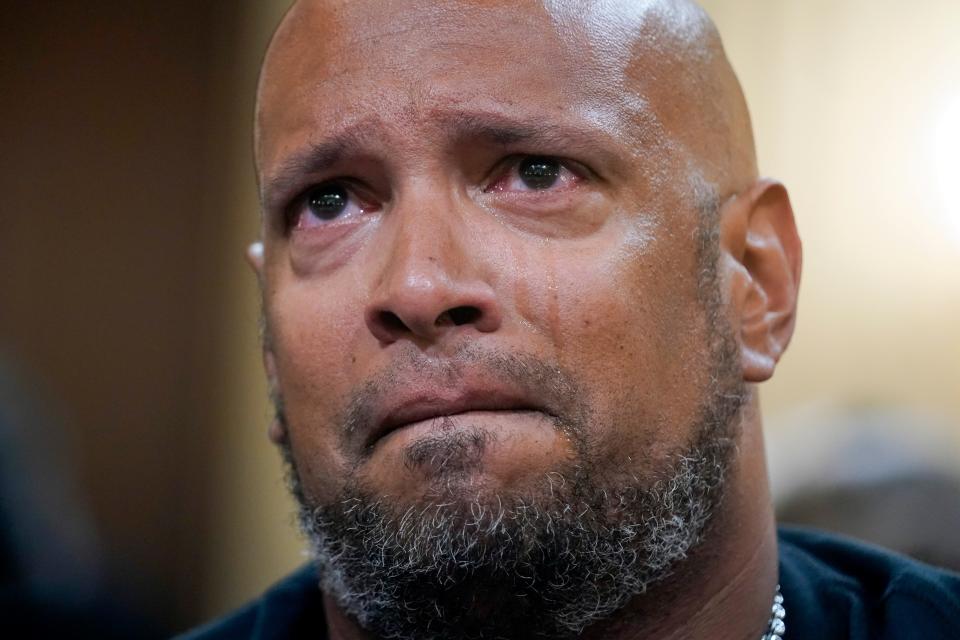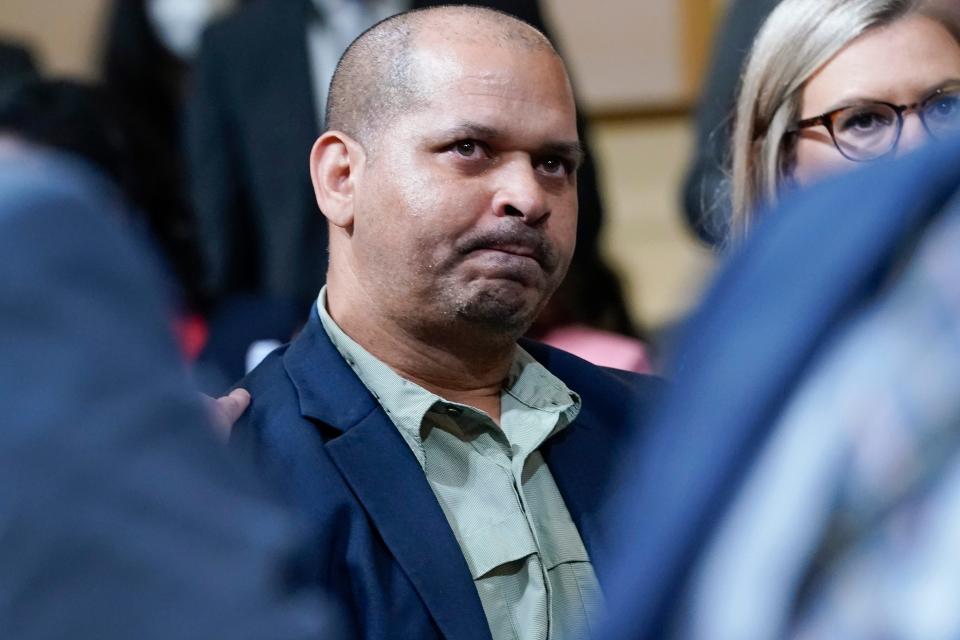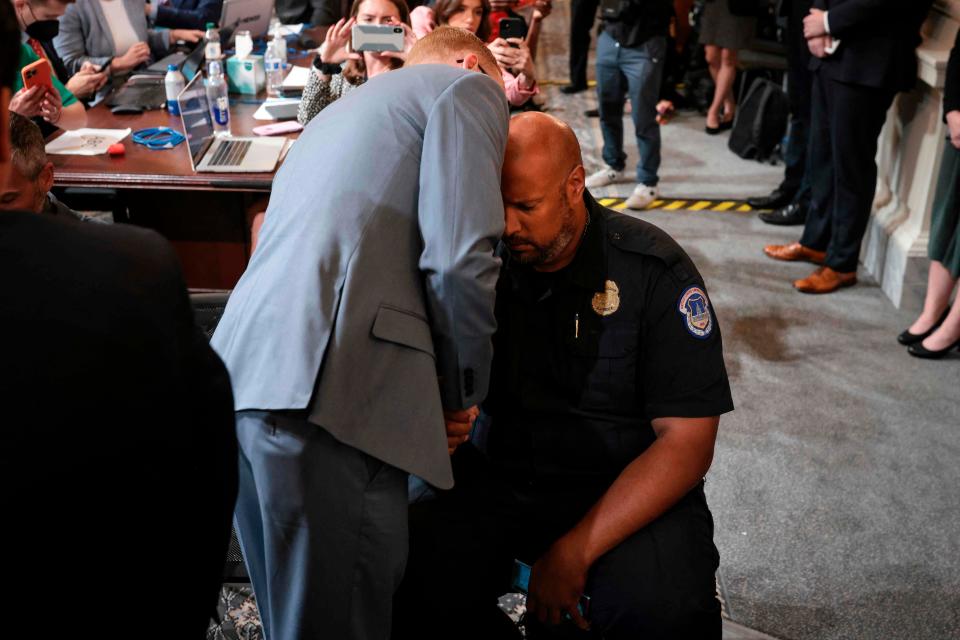'Jan. 6 ain't over': Capitol Police injured by rioters front and center for hearings
WASHINGTON – Law enforcement officials faced brutal attacks on the front lines defending the Capitol on Jan. 6, 2021. More than a year later, four of them are on the front lines again — this time, playing a central role in the room where a House committee shares its findings on the insurrection.
Capitol Police officer Harry Dunn, former D.C. police officer Michael Fanone, Washington Metropolitan Police Officer Daniel Hodges, and Capitol Police Sgt. Aquilino Gonell were the first witnesses to publicly testify before the Jan. 6 committee, a year ago this week. They've been a near-constant presence in the Cannon Caucus room for each of the committee's eight hearings this summer.
The four men faced career-ending injuries, trauma and racist insults on Jan. 6 that they've been forced to relive during the hearings. Still, they feel a duty to attend – to remind the committee and everyone watching of the human toll of the attack on the Capitol.
Pressure campaigns, predictable violence: What we learned from all eight Jan. 6 hearings
"We did our job that day," Dunn said he told committee chair Rep. Bennie Thompson, D-Miss., after testifying last year. "Now it's time to do yours."
The verdict is in: Trump ally Steve Bannon found guilty of contempt for defying Jan. 6 committee subpoena
Video: Vice president's security detail feared for their lives during Capitol riots
'Trampled and beaten by a bloodthirsty mob'
As the committee has played recordings of the attack, the four men at times have been overcome with emotion.
"Looking at those videos, I see myself in different places in almost every single frame that they show," Gonell told USA TODAY of footage of rioters trying to force their way past the police perimeter and into the Capitol.

"I saw it in real life. I saw it in real-time. I don't like watching them, I don't sit down and watch these videos," Dunn said. "Going back and watching a video of one of the most traumatic things. Who wants to relive it?"
Ketchup, regrets, blood and anger: A guide to the Jan. 6 hearings' witnesses and testimony
Fanone told USA TODAY he was more shocked by people who doubted his experience.
He was beaten unconscious and suffered a heart attack on Jan. 6. Rioters hit him with a flagpole and shocked him with a Taser, and Fanone pleaded for his life when a rioter took his gun and suggested killing him with it.
"This is the first time where I’ve experienced something that traumatic and then people told me it didn't happen and that what I experienced is not real," he said.
Rep. Jamie Raskin, D-Md., said seeing the officers in the room humanizes the hearings.
"Yes, it was an attempted political coup. Yes, it was a violent insurrection. But those are abstract propositions. They remind us every day that real people were being hit over the head with pipes and stabbed in the chest with sharpened American flags and trampled and beaten by a bloodthirsty mob," he said.
Without them and other law enforcement officers, it would have been members of Congress and Vice President Mike Pence who faced injuries or death, Raskin said.
"That would have been us," he said.

To Raskin, the group represents all the law enforcement officers who defended the Capitol, including dozens who were injured, wounded or traumatized by the attack.
"They're also there to represent the several officers who took their own lives in the aftermath of these events because they were so devastated and traumatized by the viciousness and the cruelty of the mob," Raskin said.
Four officers died by suicide after the riot.
'I had to step out of the room'
The group has at times been mentioned by committee members during proceedings.
At last week's hearing, Rep. Elaine Luria, D-Va., said that Trump has never acknowledged the officers who died because of Jan. 6.
Relatives of two officers who died by suicide in the days after the riot, D.C. Police Officer Jeffrey Smith and Capitol Police Officer Howie Liebengood, have attended the hearings, as did the longtime partner and family of Capitol Police Officer Brian Sicknick, who died of natural causes after suffering two strokes due to Jan. 6.
"We're honored to be joined tonight by police and first responders who bravely protected us on January 6," Luria said on Thursday. "We on this dais can never thank you enough for what you did to protect our democracy."
Secret Service: Agents feared for their lives during Capitol attack, made goodbye phone calls
Ken Sicknick, the brother of Brian Sicknick, told USA TODAY after the hearing that his family fears his brother's memory is being forgotten, so the committee's mention was appreciated.
Gonell became part of the committee's presentation during one hearing as well, when Raskin informed viewers that injuries to his shoulder and foot on Jan. 6 would prevent Gonell from serving as a police officer.
Gonell knew ahead of time that Raskin would tell his story, but didn't realize how powerful or emotional it would be.

"I got overwhelmed, I had to step out of the room," he said. Gonell was trailed by Dunn, who said they took a moment to sit outside in the hallway and gather themselves.
Face to face with a rioter
When they returned to the room, they were soon approached by witness Stephen Ayers, a rioter who had stormed the Capitol on Jan. 6.
Ayers first approached Dunn with an apology – an apology the officers note did not come while Ayers had the microphone.
"How can I focus on forgiveness when justice is still outstanding? I ain't got time to forgive nobody when justice ain't happened yet," said Dunn, who shook Ayers' hand but didn't stand. "It hasn't ended yet. It will end when accountability is served. Until then, Jan. 6 ain't over."

"All I want is accountability. If he was insincere or he apologized and that was not genuine or in good faith, he's still got to answer up to a judge, up to his maker," Gonell said.
Hodges told USA TODAY he was conflicted about shaking Ayers' hand. He was crushed by a door while a rioter beat his head against it and pulled off his gas mask on Jan. 6. Another rioter took his baton and bashed him with it.
“I asked him if he was sorry and he said ‘yes,’ and I said ‘I hope so,'" said Hodges.

More: Jan. 6 rioter apologizes to police officers who defended Capitol against insurrection
'I've been betrayed'
Dunn and Gonell still work at the Capitol, where they protect lawmakers who have denounced the committee.
It's upsetting, Gonell said, to hear how "the most powerful person in the world, 16 blocks away, decided to sit down and watch TV" during the violence.
Gonell's career in policing has been forced to an early end due to his injuries from Jan. 6. For now he said he is focused on trying to exercise his injured foot and shoulder, attending mental health treatment and updating his resume for the first time in more than 20 years as he faces a forced career change.
Dunn said he wants the people involved with Jan. 6 accountable and for the Justice Department to charge those who sent the rioters to the Capitol.
"Betrayal is one of the toughest emotions to ever have to swallow," Dunn said, "and I've been betrayed by the president."
This article originally appeared on USA TODAY: Jan. 6: Capitol Police injured by rioters front and center at hearings

 Yahoo Sports
Yahoo Sports 





